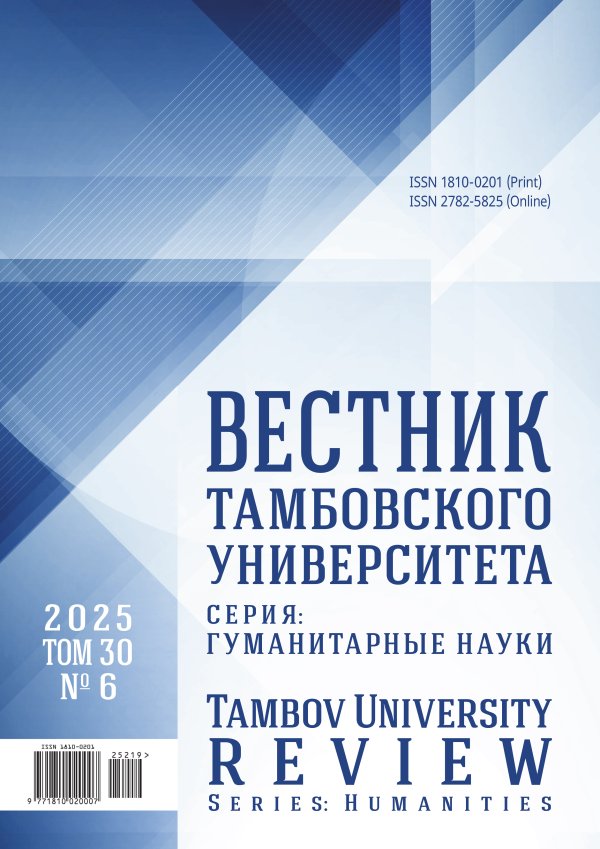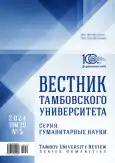Альтернативные подходы к контролю и оцениванию аудитивной компетенции у студентов гуманитарного профиля: мотивационный аспект
- Авторы: Абрамова И.Е.1
-
Учреждения:
- ФГБОУ ВО «Петрозаводский государственный университет»
- Выпуск: Том 29, № 5 (2024)
- Страницы: 1179-1193
- Раздел: ТЕОРИЯ И МЕТОДИКА ОБУЧЕНИЯ ИНОСТРАННОМУ ЯЗЫКУ
- URL: https://journal-vniispk.ru/1810-0201/article/view/297656
- DOI: https://doi.org/10.20310/1810-0201-2024-29-5-1179-1193
- ID: 297656
Цитировать
Полный текст
Аннотация
Актуальность. Быстроменяющийся рынок труда предъявляет новые требования к выпускникам вузов, в том числе к их способности воспринимать и понимать на слух иноязычную речь для успешного взаимодействия в интернациональных командах. Цель исследования – анализ влияния альтернативных способов контроля и оценивания на формирование аудитивной компетенции у студентов гуманитарного профиля и мотивацию к углубленному изучению английского языка.Материалы и методы. Применялись такие научные методы, как наблюдение, формализованный анкетный опрос с вопросами открытого и закрытого типов, сравнительный анализ, экспертное оценивание.Результаты исследования. Доказано, что обновление подходов к мониторингу и контролю аудитивной компетенции не только способствует ее развитию, но и повышает мотивацию студентов к аудированию. Так, после эксперимента количество студентов с высоким уровнем аудитивной компетенции увеличилось с 5,3 до 16 %, а количество студентов с низким ее уровнем уменьшилось с 73,4 до 25,3 %. Выявлено статистически значимое повышение уровня мотивации к аудированию у студентов ЭГ по сравнению со студентами КГ (ЭГ χ̅ = 4,32; Мо = 4, КГ χ̅= 3,17; Мо = 2).Выводы. Апробированные виды контроля и оценивания уровней аудитивной компетенции универсальны и могут быть рекомендованы к применению при иноязычной подготовке студентов как гуманитарных, так технических и естественно-научных специальностей.
Об авторах
И. Е. Абрамова
ФГБОУ ВО «Петрозаводский государственный университет»
Автор, ответственный за переписку.
Email: lapucherabr@gmail.com
ORCID iD: 0000-0002-1263-3599
доктор филологических наук, доцент, заведующий кафедрой иностранных языков гуманитарных направлений
185910, Российская Федерация, г. Петрозаводск, пр-кт Ленина, 33Список литературы
- Стукаленко Е.А., Мосина В.С. Уровень человеческого капитала как фактор развития цифровой экономики в России // Идеи и идеалы. 2020. Т. 12. № 2-2. С. 297-321. https://doi.org/10.17212/2075-0862-2020-12.2.2-297-321, https://elibrary.ru/sktlkt
- Кан Е.Н. Дизайн-мышление как способ управления энтропией в эпоху «VUCA-BANI-SHIVA-мира» // Креативная экономика. 2023. Т. 17. № 9. С. 3187-3200. https://doi.org/10.18334/ce.17.9.119039, https://elibrary.ru/kmesfu
- Safonova V. Co-learning of languages and cultures in the mirror of world tendencies in developing modern language education // Language and Culture. 2014. № 1. P. 109-126. https://elibrary.ru/toenhr
- Cook D.A. Motivation to learn: an overview of contemporary theories // Medical Education. 2016. Vol. 50. № 10. Р. 997-1014. http://dx.doi.org/10.1111/medu.13074
- Molloy L.E., Gest S.D., Rulison K.L. Peer influences on academic motivation: exploring multiple methods of assessing youths’ most “influential” peer relationships // The Journal of Early Adolescence. 2011. Vol. 31. № 1. Р. 13-40. http://dx.doi.org/10.1177/0272431610384487
- Attle S., Baker B. Cooperative learning in a competitive environment: classroom applications // International Journal of Teaching and Learning in Higher Education. 2007. Vol. 19. № 1. Р. 77-83.
- Абрамова И.Е., Шишмолина Е.П., Ананьина А.В. Преимущества аутентичного оценивания при обучении иностранному языку студентов-нелингвистов // Самарский научный вестник. 2018. Т. 7. № 4 (25). С. 287-293. https://doi.org/10.24411/2309-4370-2018-14301, https://elibrary.ru/yppgol
- Бароненко Е.А., Райсвих Ю.А., Скоробренко И.А. Синтез традиционных и нетрадиционных форм контроля как фактор повышения эффективности процесса обучения иностранным языкам // Вестник Южно-Уральского государственного гуманитарно-педагогического университета. 2020. Т. 5. № 158. С. 7-24. https://doi.org/10.25588/CSPU.2020.158.5.001, https://elibrary.ru/gjatmc
- Степанова Н.А. Некоторые теоретические вопросы контроля на современном этапе развития методики преподавания иностранного языка // Вестник Тамбовского университета. Серия: Гуманитарные науки. 2021. Т. 26. № 190. С. 53-59. https://doi.org/10.20310/1810-0201-2021-26-190-53-59, https://elibrary.ru/gexxrq
- Абрамова И.Е., Шишмолина Е.П. Формирование навыков самоорганизации и самооценки студентов в конкурентной иноязычной обучающей среде: практический опыт // Образование и наука. 2020. Т. 22. № 10. С. 161-185. https://doi.org/10.17853/1994-5639-2020-10-161-185, https://elibrary.ru/dmefgx
- Крупнова Н.А., Морозов Д.Л. К вопросу о контролирующих аудитивных упражнениях // Язык и культура. 2014. № 2 (26). С. 118-122. https://elibrary.ru/shdyfh
- Chen C.W. Guided listening with listening journals and curated materials: a metacognitive approach // Innovation in Language Learning and Teaching. 2019. Vol. 13. № 2. Р. 133-146. https://doi.org/10.1080/17501229.2017.1381104
- Kwon S.K., Yu G. Investigating differences in test-takers’ use of cognitive and metacognitive strategies in audio-only and video-based listening comprehension test // System. 2023. Vol. 114. Р. 103017. https://doi.org/10.1016/j.system.2023.103017
- Osipenko L., Guseva V. Place and role of visualization among the modern methodological tools of higher education process // Education and Information Technologies. 2023. Vol. 28. P. 3667-3680 https://doi.org/10.1007/s10639-022-11310-2
- Изотова Н.В., Буглаева Е.Ю. Система средств визуализации в обучении иностранному языку // Вестник БГУ. 2015. № 2. С. 70-74. https://elibrary.ru/uyymof
- Креер М.Я., Пилипчук Е.Д. Применение инфографики в обучении иностранному языку студентовэкономистов и его учебно-педагогический потенциал // Азимут научных исследований: педагогика и психология. 2018. Т. 7. № 3 (24). С. 131-135. https://elibrary.ru/ybczdn
- Аликина Е.В., Рапакова Т.Б. Формирование инфографической компетенции в научно-исследовательской деятельности курсантов военного вуза в процессе изучения иностранного языка // Вестник ПНИПУ. Проблемы языкознания и педагогики. 2019. №. 1. С. 147-157. https://doi.org/10.15593/2224- 9389%2F2018.4.12, https://elibrary.ru/qxjrfo
- Hanna J. Visualization While Reading: A Review of the Comprehension Strategy // The Oklahoma English Journal. 2020. P. 40-43.
- Vílchez-Román C., Sanguinetti S., Mauricio-Salas M. Applied bibliometrics and information visualization for decision-making processes in higher education institutions // Library Hi Tech. 2021. Vol. 39. № 1. P. 263-283. https://doi.org/10.1108/LHT-10-2019-0209, https://elibrary.ru/avtbna
- Ткачева И.А., Яковлева Л.В., Василенко В.А. Использование видеофильма как способ повышения познавательной активности студентов в обучении аудированию на занятиях по иностранному языку // Ученые записки Санкт-Петербургского университета технологий управления и экономики. 2021. № 1 (73). С. 5-13. https://elibrary.ru/qtjbht
- Monica E., Izzah L. The Effectiveness of Ledp Application on students’ Listening Comprehension // Modality Journal: International Journal of Linguistics and Literature. 2023. Vol. 3. № 2. P. 118-124. https://doi.org/10.30983/mj.v3i2.6874, https://elibrary.ru/zccjfh
- Silvi N.I., Nurjati N. The effect of using spotify application on EFL listening achievement of senior high school student // SCRIPTA. 2023. Vol. 10. № 1. P. 166-174. https://doi.org/10.37729/scripta.v10i1.3164
Дополнительные файлы









